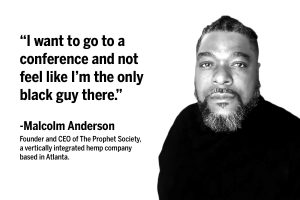
Opportunities abound in the hemp industry, but to attain the crop’s full potential, it’s going to require people from all walks of life, according to industry observers.
“I want to go to a conference and not feel like I’m the only black guy there,” said Malcolm Anderson, founder and CEO of The Prophet Society, a vertically integrated hemp company based in Atlanta.
“Everybody wants to see somebody they know in the industry they’re in, who they can relate to.”
With its varied applications, hemp could spark more environmentally sustainable practices and products, and also bring more diversity to agriculture, he said.
More diversity needed
While optimism abounds over hemp’s potential to bring new populations to agriculture, obstacles remain.
The U.S. Department of Agriculture (USDA) has a history of discrimination against small farmers and farmers of color, according to agricultural attorney Jillian Hishaw.
“As the country becomes more diverse, the landscape of the agricultural industry does not,” she told Hemp Industry Daily.
The founder of F.A.R.M.S., a nonprofit organization based in Charlotte, North Carolina, Hishaw advocates for small farms owned by black, white, Latino, American Indian and female farmers.
“Hemp is the first step to diversifying U.S. agriculture, but only if we collectively want it,” she said.

According to the 2017 USDA Census, 2% of corporate farms own 30% of the U.S agricultural market, yet more than half the farmers in the U.S. are considered to be small farms with 200 acres or fewer.
The data shows that between 2012 and 2017, 50% of farmers made $10,000 or less from their land, Hishaw told Hemp Industry Daily.
She said most corporate farms in the United States are owned and operated by white males.
Further, the amount of farmland owned by farmers of color, including blacks, Latinos and American Indians, is minuscule compared to the amount of land owned by white farmers.
Hishaw put the national farming acreage breakdown at:
- 849 million acres owned by whites.
- 58 million acres owned by American Indians.
- 32 million acres owned by Hispanics.
- 4.6 million acres owned by African Americans.
- 2.9 million acres owned by Asians.
Each year, those numbers erode for farmers of color, as 30,000 acres of farmland are lost by black farmers annually, according to Hishaw.
“It’s just constant discrimination” by federal agricultural regulators, she noted.
The 10-year restriction on felons growing hemp written into the 2018 Farm Bill particularly discriminates against black farmers, she said.
“African Americans have a four-times-higher arrest record than whites. And with the 10-year felony restriction, that’s just automatically taking particularly African Americans out of this industry,” Hishaw told Hemp Industry Daily.
“That’s purposeful.”
Anderson agreed, saying the 10-year felony restriction is an unfair double penalty for “black and brown people” who have already served time for cannabis-related offenses.
“I just don’t understand the logic in punishing people twice – the point of jail and prison is to serve your debt to society,” Anderson said.
Existing license fees already serve as a barrier to entry for ex-felons who might not have the resources to enter the industry, Anderson said, but after 10 years, those fees – and barriers – might be even higher.
“It’s hidden racism built into a system for an industry that hasn’t even seen its full potential yet,” he said.
The USDA declined to answer written questions from Hemp Industry Daily about allegations of discrimination by agency employees or to confirm numbers for farmland owned by operators of color.
Instead, an agency spokesperson replied that the USDA uses “innovative marketing methods” to let new and underserved farming communities know about assistance programs, including:
- Crop insurance.
- Microloans.
- Disaster assistance.
- Conservation.
The spokesperson directed farmers of color to an agency website to learn more.
USDA: Capital, insurance accessible for all farmers
When the USDA published its interim final rule for hemp production on Oct. 31, divisions within the agency revealed programs to make crop insurance and financial lending programs available to hemp farmers, as they are to farmers of other commodities.
The agency’s capital lending and insurance programs are administered to allow for equal opportunity among farmers, according to Bill Northey, the USDA’s undersecretary for Farm Production and Conservation.
“The opportunities that we have for minority, new and beginning farmers – those programs would also provide eligibility for hemp growers,” Northey said.
In July, the USDA announced $16 million in available funding “to help socially disadvantaged and veteran farmers and ranchers own and operate successful farms.”
Formerly known as the 2501 Program, the USDA’s Outreach and Assistance for Socially Disadvantaged Farmers and Ranchers and Veteran Farmers and Ranchers Program awards grants to farmers and ranchers who have experienced barriers to service because of racial or ethnic prejudice. The 2014 Farm Bill expanded the program’s reach to veterans.
“All farmers and ranchers deserve equal access to USDA programs and services,” said Mike Beatty, director of the USDA Office of Partnerships and Public Engagement.
“2501 grants go a long way in fulfilling our mission to reach historically underserved communities and ensure their equitable participation in our programs.”
Eligible applicants include not-for-profit organizations, community-based groups and a range of higher-education institutions serving African Americans, American Indians, Alaska Natives, Hispanics, Asians and Pacific Islanders.
Laura Drotleff can be reached at [email protected]

